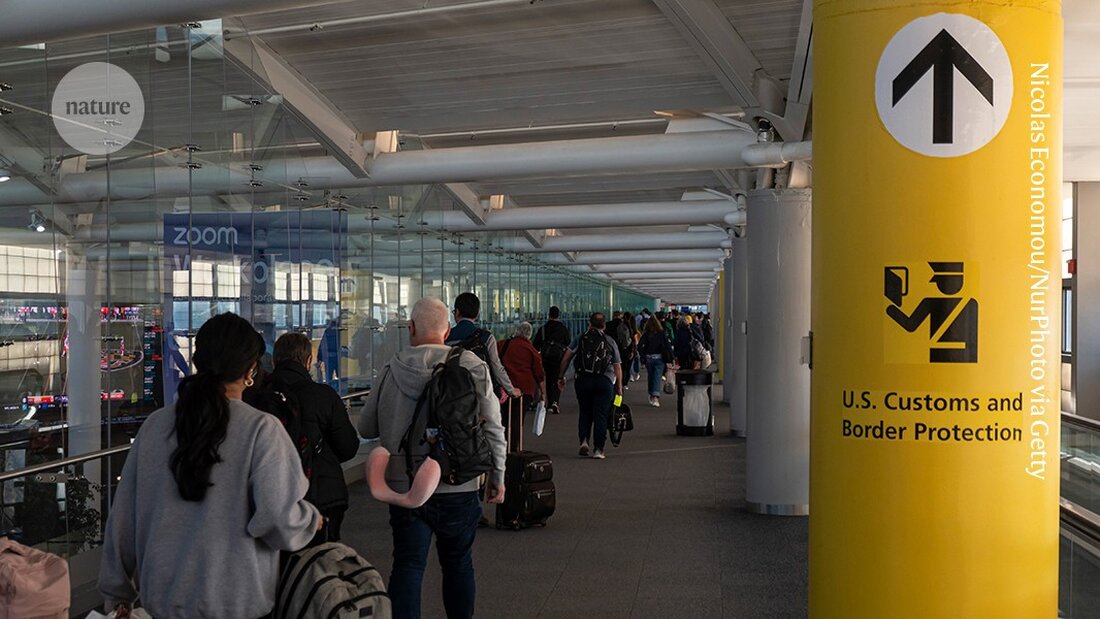Fear of detention: Researchers at the US border crossing raise travel concerns
The increased controls at the US border are unsettling researchers around the world who are reconsidering planned trips to the USA.

Fear of detention: Researchers at the US border crossing raise travel concerns
An immigration operation in the United States worries the global research community. High profile arrests and deportations of academics are fueling fears, even among travelers with valid immigration documents.
International researchers who spoke to Nature are reconsidering their planned trips to the United States for conferences and research. Scientists in the U.S. who are not citizens are also considering their own travel plans, fearing that if they leave they may not be allowed back into the country.
“The fear is palpable,” says Jonathan Grode, managing partner at the immigration law firm Green and Spiegel in Philadelphia, Pennsylvania. Grode receives at least 20 calls a day from clients asking if it is safe to travel.
High incident profiles
The pressure has been building for months, since the new administration of US President Donald Trump, which came with the promise of tightening border security, is taking shape.
Many scientists have been alarmed by several incidents in recent months. In one case, a kidney transplant specialist at Brown University in Providence, Rhode Island, was deported to Lebanon after a valid visa while attempting to return to the United States. It was reported later that images on her phone linked her to Hezbollah, which is considered a foreign terrorist organization by U.S. authorities.
In another incident, U.S. border officials harshly confronted a French scientist traveling to a scientific conference near Houston. The French government said he was deported after border officials searched his personal devices and found messages about "personal opinions" on U.S. research policy. The US Department of the Interior says the scientist had confidential information from a US national laboratory on his equipment "in violation of a nondisclosure agreement" and that "any suggestion that his dismissal was based on political beliefs is completely false."
The researcher is a planetary scientist who has worked with NASA on Mars science, multiple sources confirmed to Nature. He did not attend the conference.
Andrea Liu, a physicist at the University of Pennsylvania in Philadelphia, says she was "shocked" to hear about the French scientist's experiences. “That makes me think that if you really want to come and do science, it’s safer — bring a prepaid cell phone and a blank laptop so this doesn’t happen to you.”
U.S. border agents have the right to search the phones and laptops of people entering the country, even citizens, explains Carolina Regales, an attorney at Klasko Immigration Law Partners in Philadelphia. Since 2019, people applying for a visa to the United States have also been required to provide their social media usernames, although messages on these accounts have rarely been used to deny entry in the past, she explains.
Grode says most travelers to the United States have nothing to worry about: Despite a few high-profile cases, hundreds of thousands of people enter the U.S. every month and continue to do so smoothly.
However, if someone doesn't have a clean criminal record, Grode advises being particularly careful. An expired visa or run-in with the law, even seemingly minor, could be a problem in the current administration, which is "as tough as it gets," he explains.
Security concerns
Concerns about the trip have increased, particularly for researchers who have faced the Trump administration's opposition to it Transgender rights, Diversity, Equity and Inclusion (DEI) programs as well as specific research topics such as Climate change and feel affected by misinformation. A geophysicist from Canada, who spoke to Nature on condition of anonymity, is now reconsidering a planned trip to the United States in May to meet with colleagues and conduct research. The researcher, who is a trans woman, says she doesn't know what information U.S. border authorities have about her from previous visits to the country when she had identification documents under a different name.
“It seems that in the current political climate, any kind of irregularities or discrepancies are immediately addressed,” she says.

 Suche
Suche
 Mein Konto
Mein Konto
